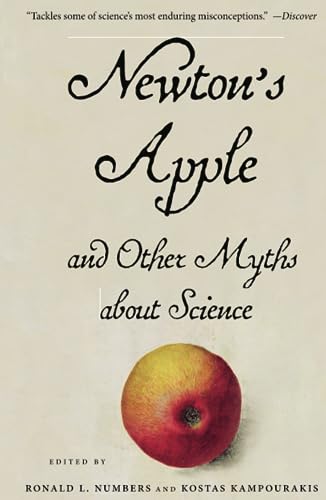Items related to Newton’s Apple and Other Myths about Science

Synopsis
A falling apple inspired Isaac Newton’s insight into the law of gravity―or so the story goes. Is it true? Perhaps not. But the more intriguing question is why such stories endure as explanations of how science happens. Newton’s Apple and Other Myths about Science brushes away popular misconceptions to provide a clearer picture of great scientific breakthroughs from ancient times to the present.
Among the myths refuted in this volume is the idea that no science was done in the Dark Ages, that alchemy and astrology were purely superstitious pursuits, that fear of public reaction alone led Darwin to delay publishing his theory of evolution, and that Gregor Mendel was far ahead of his time as a pioneer of genetics. Several twentieth-century myths about particle physics, Einstein’s theory of relativity, and more are discredited here as well. In addition, a number of broad generalizations about science go under the microscope of history: the notion that religion impeded science, that scientists typically adhere to a codified “scientific method,” and that a bright line can be drawn between legitimate science and pseudoscience.
Edited by Ronald Numbers and Kostas Kampourakis, Newton’s Apple and Other Myths about Science debunks the widespread belief that science advances when individual geniuses experience “Eureka!” moments and suddenly comprehend what those around them could never imagine. Science has always been a cooperative enterprise of dedicated, fallible human beings, for whom context, collaboration, and sheer good luck are the essential elements of discovery.
"synopsis" may belong to another edition of this title.
About the Authors
Ronald L. Numbers was Hilldale Professor Emeritus of the History of Science and Medicine at the University of Wisconsin–Madison.
Kostas Kampourakis is Scientific Collaborator, Section of Biology and University Teacher Training Institute, University of Geneva.
"About this title" may belong to another edition of this title.
FREE shipping within U.S.A.
Destination, rates & speedsSearch results for Newton’s Apple and Other Myths about Science
Newton's Apple and Other Myths about Science
Seller: Better World Books, Mishawaka, IN, U.S.A.
Condition: Very Good. Former library book; may include library markings. Used book that is in excellent condition. May show signs of wear or have minor defects. Seller Inventory # 12811189-6
Quantity: 1 available
Newton's Apple and Other Myths about Science
Seller: Better World Books, Mishawaka, IN, U.S.A.
Condition: Good. Former library book; may include library markings. Used book that is in clean, average condition without any missing pages. Seller Inventory # 15245966-6
Quantity: 1 available
Newton's Apple and Other Myths about Science
Seller: Better World Books: West, Reno, NV, U.S.A.
Condition: Good. Former library book; may include library markings. Used book that is in clean, average condition without any missing pages. Seller Inventory # 15245966-6
Quantity: 2 available
Newton's Apple and Other Myths about Science
Seller: ThriftBooks-Atlanta, AUSTELL, GA, U.S.A.
Hardcover. Condition: Very Good. No Jacket. May have limited writing in cover pages. Pages are unmarked. ~ ThriftBooks: Read More, Spend Less. Seller Inventory # G0674967984I4N00
Quantity: 1 available
Newton's Apple and Other Myths about Science
Seller: ThriftBooks-Dallas, Dallas, TX, U.S.A.
Hardcover. Condition: Very Good. No Jacket. Former library book; May have limited writing in cover pages. Pages are unmarked. ~ ThriftBooks: Read More, Spend Less. Seller Inventory # G0674967984I4N10
Quantity: 1 available
Newton's Apple and Other Myths about Science
Seller: ThriftBooks-Phoenix, Phoenix, AZ, U.S.A.
Hardcover. Condition: Very Good. No Jacket. Former library book; May have limited writing in cover pages. Pages are unmarked. ~ ThriftBooks: Read More, Spend Less. Seller Inventory # G0674967984I4N10
Quantity: 1 available
Newton's Apple and Other Myths about Science
Seller: One Planet Books, Columbia, MO, U.S.A.
hardcover. Condition: Good. Illustrated. Ships in a BOX from Central Missouri! May not include working access code. Will not include dust jacket. Has used sticker(s) and some writing and/or highlighting. UPS shipping for most packages, (Priority Mail for AK/HI/APO/PO Boxes). Seller Inventory # 002038953U
Quantity: 4 available
Newton's Apple and Other Myths About Science
Seller: Valley Books, AMHERST, MA, U.S.A.
Hardcover. Condition: New. Dust Jacket Condition: New. First Printing. 287pp. Photos on request. Size: 8vo - over 7ĺ" - 9ĺ" tall. Seller Inventory # 084461
Quantity: 1 available
Newton‚s Apple and Other Myths about Science
Seller: Half Price Books Inc., Dallas, TX, U.S.A.
hardcover. Condition: Very Good. Connecting readers with great books since 1972! Used books may not include companion materials, and may have some shelf wear or limited writing. We ship orders daily and Customer Service is our top priority! Seller Inventory # S_447143842
Quantity: 1 available
Newton’s Apple and Other Myths about Science.
Seller: Research Ink, Takoma Park, MD, U.S.A.
Hardback. Condition: As new. xiv + 287 pp. dj. book. Seller Inventory # 32928
Quantity: 1 available

